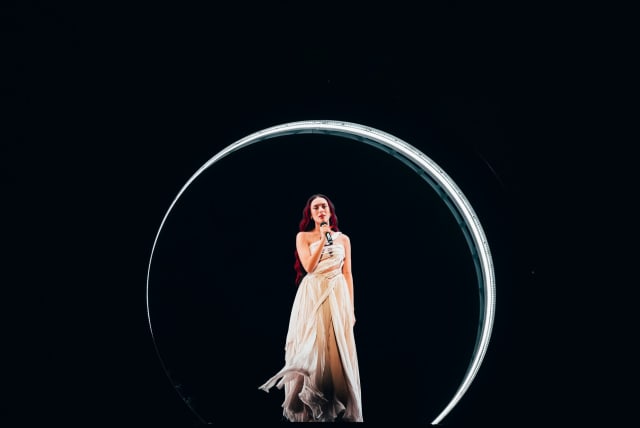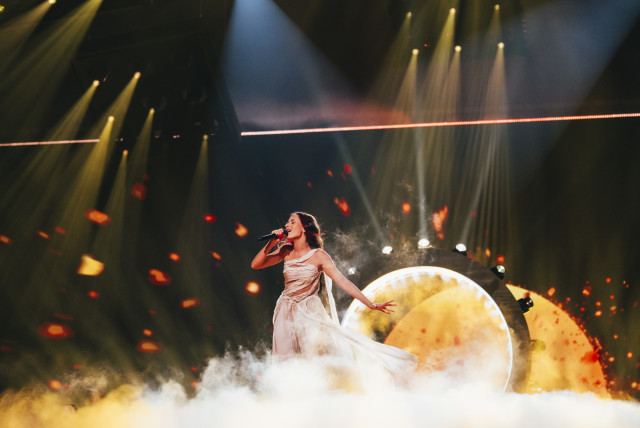Before Eurovision starts, Israel's Eden Golan marks Holocaust Remembrance Day

Israeli Eurovision contestant Eden Golan skipped the song contest's opening gala ceremony on the Turquoise Carpet to instead attend a Holocaust Remembrance Day ceremony with Malmo's Jewish residents.
Just before the opening of the Eurovision song contest on May 7, Israel’s contestant, Eden Golan, skipped the opening gala ceremony on Sunday, the so-called Turquoise Carpet. Instead, she opted to attend a Holocaust Remembrance Day ceremony on Sunday night with the Jewish community of Malmo, Sweden, which is hosting the competition this year.
Golan, who sang “Hatikva,” the Israeli national anthem, with some of Malmo’s Jewish residents, also lit memorial candles with them to honor the memory of those who died in the Holocaust. One of the representatives of the Jewish community who spoke at the ceremony talked about the relevance of marking this day following the October 7 by Hamas in Israel, which was the largest massacre of Jews since the Holocaust and which was openly celebrated by some of Malmo’s Muslim residents. Golan has spoken of her feeling of being on a “mission” to represent Israel in the hugely popular song contest following this massacre and during the war. Instead of a photograph as a profile picture on her Instagram account, the 20-year-old singer uses an image of a yellow ribbon, which symbolizes the importance of remembering the 133 hostages currently held by Hamas in Gaza.
While the opening gala is a fun part of the competition most years, Golan said she had no problem skipping it because it was held so close to Holocaust Remembrance Day. "Today, on the eve of Holocaust Remembrance Day, we will light a candle in memory of the six million of our people who were murdered – and remind the world that never again is now," Golan said in a black-and-white video posted to her Instagram account on Sunday in which she lit a candle as soft music played.
View this post on Instagram
Eurovision 2024: When will Israel perform in the semi-finals?
While the first semi-final of Eurovision will be held Tuesday night, Golan is set to perform in the second group, on May 9. In spite of calls for Israel to be ejected from the competition by some artists because of the war in Gaza, Israel is holding onto to eighth place out of 37 in the betting tables, a generally accurate predictor of the competition.
The song that is widely predicted to win the competition, “Rim Tim Tagi Dim” by Baby Lasagna of Croatia, will be presented in the first semi-final on Tuesday night, which the combined betting tables give a 25% chance of taking the top prize. Golan will compete against Austria, Albania, Estonia, Georgia, Malta, the Netherlands, Switzerland, Norway, Latvia, Greece, San Marino, Belgium, Armenia, Denmark, and the Czech Republic on May 9 in the second semi-final, and Spain, Italy, and France will also perform. Baby Lasagna is a male solo artist and the song is a high-energy tune that combines techno, heavy metal, pop and other genres about a young man who plans to go abroad to seek his fortune. The Grand Final will be held on May 11, and Golan will perform again if “Hurricane” makes it to the final.
Israel’s song, “Hurricane,” contains veiled references to the October 7 attack and was a replacement for a previous song, “October Rain,” which more explicitly referenced the tragedy. Israel has won the song contest four times since it began taking part in 1973, most recently with Netta Barzilai’s “Toy” in 2018.
Jerusalem Post Store
`; document.getElementById("linkPremium").innerHTML = cont; var divWithLink = document.getElementById("premium-link"); if (divWithLink !== null && divWithLink !== 'undefined') { divWithLink.style.border = "solid 1px #cb0f3e"; divWithLink.style.textAlign = "center"; divWithLink.style.marginBottom = "15px"; divWithLink.style.marginTop = "15px"; divWithLink.style.width = "100%"; divWithLink.style.backgroundColor = "#122952"; divWithLink.style.color = "#ffffff"; divWithLink.style.lineHeight = "1.5"; } } (function (v, i) { });

